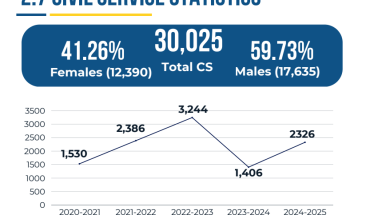
Govt Ends Regular Contracts, Enforces Consolidated Terms
TIL BDR GHALLEY
Thimphu
In May 2024, the Royal Civil Service Commission (RCSC) issued a notification declaring that all new teacher appointments under the BCSE 2024 B.Ed. standby candidates will be made under the consolidated contract system. The notification further specified that existing Regular Contract teachers will be transitioned to the consolidated contract terms. Simultaneously, the Ministry of Education and Skills Development (MoESD) issued a directive requiring all contract teachers to appear for the BCSE exam to be eligible for regular appointments.
This move signifies the end of the Regular Contract (RCT) system for teacher recruitment, raising several questions regarding the rationale behind discontinuing the RCT system, the implications for the entitlements and job security of current regular contract teachers, and whether this transition contradicts the government’s pledge to regularize contract employees.
During the meet the press session on July 4, Lyonpo Yeezang Dee Thapa, MoESD, stated “that the transition to consolidated contracts is aimed at ensuring fairness, consistency, and financial prudence across the civil service.” This reform seeks to harmonize contract terms and foster equitable treatment among employees in similar roles.
“As per Section 4.4.1.1 of the Bhutan Civil Service Rules and Regulations (BCSR), regular appointments are intended only for positions requiring skills that are critically needed and scarce,” the Ministry stated. “However, this provision had been inconsistently applied, especially in the education sector. B.Ed. and PGDE graduates, including those from BCSE standby lists and former teachers, were appointed under varying contract types despite having identical qualifications and responsibilities. This disparity created unnecessary discrepancies and a sense of inequality.”
The Ministry cited the medical sector as an example where contract types are aligned with the degree of specialization required. Only four medical professionals holding rare specializations have been appointed on regular contracts, demonstrating a carefully targeted approach to regular appointments based on critical skill scarcity.
This contrast highlighted the need to realign the contract system in the education sector to ensure fairness, transparency, and compliance with the civil service regulations.
Financial considerations were also a key factor driving the reform. The Ministry pointed out that the Regular Contract scheme imposed a significant burden on government finances due to a 30% contract allowance that is absent under the consolidated contract system. This allowance added to the overall cost of the RCT scheme, making it unsustainable.
“Streamlining contract types promotes consistency and ensures better fiscal discipline,” Lyonpo said. “This shift upholds fairness, transparency, and sustainability not only within the education sector but across the civil service as a whole.”
Regarding the transition of existing regular contract teachers to the consolidated contract system, the Ministry assured that the positions and grades of these teachers will remain protected. “There will be no change to their current grade. Teachers will continue to serve at the same position level, such as P5B or according to their experience,” the Ministry affirmed. This move ensures continuity and recognition of their service and contributions.
The key adjustment involves the allowance structure. Under the RCT system, teachers were entitled to a 30% contract allowance, which will no longer be applicable under the Consolidated Contract model. The Ministry justified this change by emphasizing parity with other sectors, where even highly specialized professionals serve under consolidated contracts without such allowances. This alignment supports the government’s broader efforts toward fiscal discipline and sustainable human resource management.
The transition has sparked debate about the government’s pledge to regularise contract employees. Addressing these concerns, the Ministry clarified, “Regularisation is based on merit and is not automatic. Contract employees must meet the necessary qualifications and successfully complete the regularisation process.” This policy underscores the government’s commitment to ensuring that only qualified personnel secure regular appointments, maintaining standards and efficiency within the civil service.
The Ministry expressed strong support for the ongoing human resource reform initiative. It underscored that the reforms aim to build a more efficient civil service, promote a cost-effective government system, and maintain consistent employment standards across all agencies, grounded in fairness.
The new consolidated contract model is expected to eliminate existing disparities and foster a more uniform and transparent employment framework for teachers and other civil servants.
As part of the reform, contract teachers are encouraged to participate in the BCSE examination for eligibility to regular appointments, reinforcing the merit-based approach. The government’s focus remains on ensuring a fair process that aligns with civil service regulations while safeguarding fiscal responsibility.
The shift from the regular contract system to consolidated contracts marks a significant step in Bhutan’s efforts to modernize its public sector employment practices. By streamlining contract types, protecting employee grades, and promoting merit-based regularisation, the government aims to strengthen the education sector’s human resources while maintaining fiscal sustainability.
The Ministry reaffirmed that these reforms align with broader civil service principles to promote fairness, transparency, and efficiency for all government employees.





